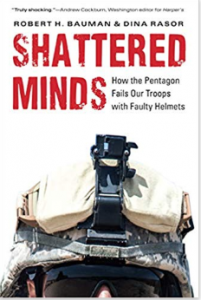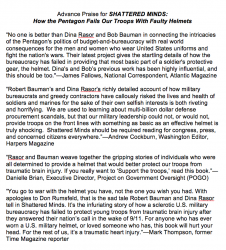“Shattered Minds: How the Pentagon Fails Our Troops with Faulty Helmets,” Publishing March 1
 I’m excited that Shattered Minds: How the Pentagon Fails Our Troops with Faulty Helmets will be published by Potomac Books on March 1, 2019. In 2016, I wrote about research in to new materials that could improve the safety features of military helmets. And as I explained in a 2018 blog post, I originally commissioned the book in 2008 when I was acquiring new titles for Union Square Press. After I left that job, the contract was canceled, and almost a decade later I ended up as the agent for the book, placing it with Potomac Books last year. A circuitous path, indeed. Below are the superb pre-publication blurbs the book by Robert H. Baumann and Dina Rasor has received. I’m delighted to see this early reception for the book.
I’m excited that Shattered Minds: How the Pentagon Fails Our Troops with Faulty Helmets will be published by Potomac Books on March 1, 2019. In 2016, I wrote about research in to new materials that could improve the safety features of military helmets. And as I explained in a 2018 blog post, I originally commissioned the book in 2008 when I was acquiring new titles for Union Square Press. After I left that job, the contract was canceled, and almost a decade later I ended up as the agent for the book, placing it with Potomac Books last year. A circuitous path, indeed. Below are the superb pre-publication blurbs the book by Robert H. Baumann and Dina Rasor has received. I’m delighted to see this early reception for the book.
Advance Praise for SHATTERED MINDS:
How the Pentagon Fails Our Troops with Faulty Helmets
“No one is better than Dina Rasor and Bob Bauman in connecting the intricacies of the Pentagon’s politics of budget-and-bureaucracy with real world consequences for the men and women who wear United States uniforms and fight the nation’s wars. Their latest project gives the startling details of how the bureaucracy has failed in providing that most basic part of a soldier’s protective gear, the helmet. Dina’s and Bob’s previous work has been highly influential, and this should be too.”—James Fallows, National Correspondent, Atlantic Magazine
“Dina Rasor and Robert Bauman are some of the most experienced and tenacious advocates in America. Year after year, Dina and Bob have been sounding the alarm and demanding accountability on behalf of our troops and veterans. They have changed policies and helped save lives. And they always have our back. Dina’s and Bob’s critical voices must be heard—now more than ever.”—Paul Rieckhoff, CEO and founder of Iraq and Afghanistan Veterans of America and author of Chasing Ghosts
“Robert Bauman’s and Dina Rasor’s richly detailed account of how military bureaucrats and greedy contractors have callously risked the lives and health of soldiers and marines for the sake of their own selfish interests is both riveting and horrifying. We are used to learning about multi-billion dollar defense procurement scandals, but that our military leadership could not, or would not, provide troops on the front lines with something as basic as an effective helmet is truly shocking. Shattered Minds should be required reading for congress, press, and concerned citizens everywhere.”—Andrew Cockburn, Washington Editor, Harpers Magazine
“Rasor and Bauman weave together the gripping stories of individuals who were all determined to provide a helmet that would better protect our troops from traumatic brain injury. If you really want to ‘Support the troops,’ read this book.”—Danielle Brian, Executive Director, Project on Government Oversight (POGO)
“You go to war with the helmet you have, not the one you wish you had. With apologies to Don Rumsfeld, that is the sad tale Robert Bauman and Dina Rasor tell in Shattered Minds. It’s the infuriating story of how a sclerotic U.S. military bureaucracy has failed to protect young troops from traumatic brain injury after they answered their nation’s call in the wake of 9/11. For anyone who has ever worn a U.S. military helmet, or loved someone who has, this book will hurt your head. For the rest of us, it’s a traumatic heart injury.”—Mark Thompson, former Time Magazine reporter

